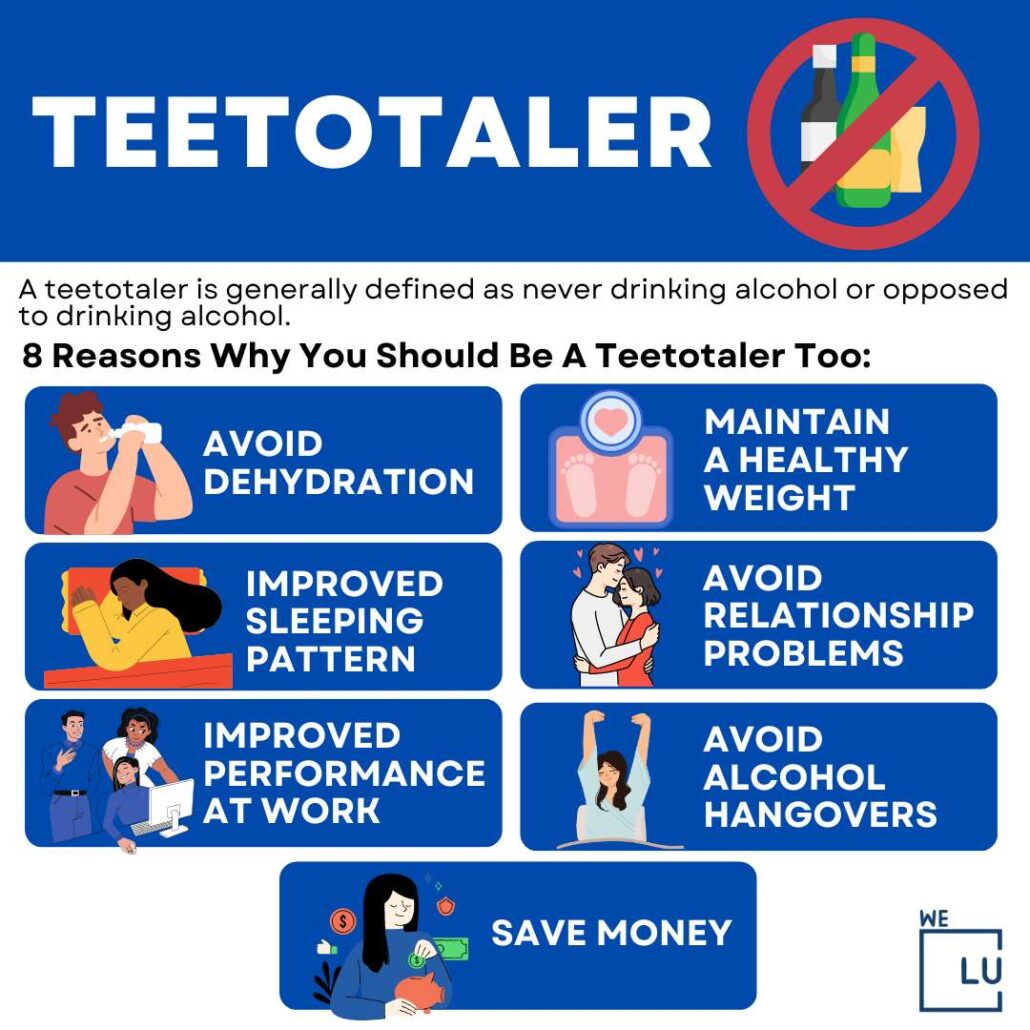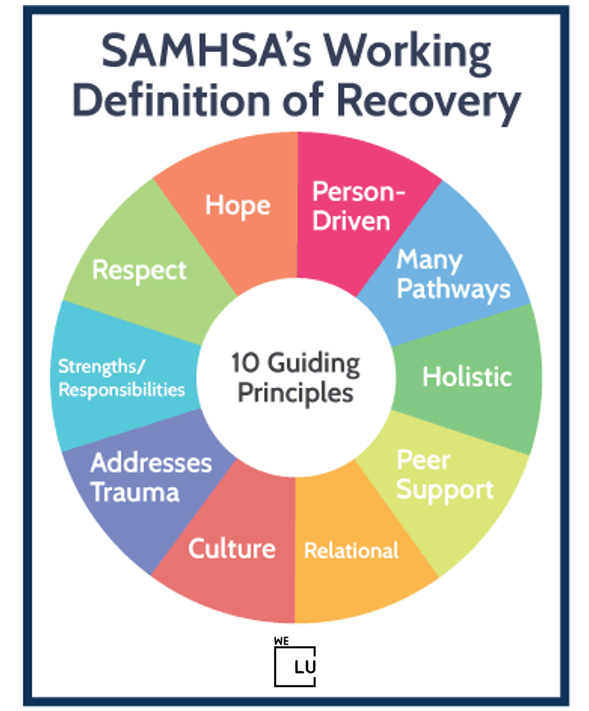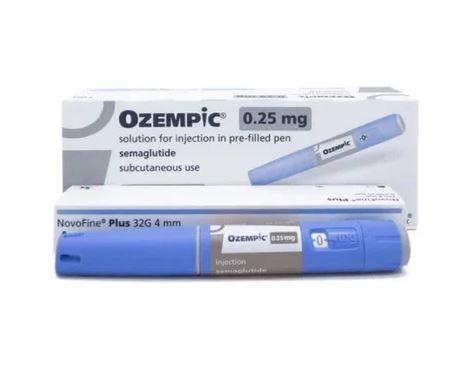Teetotaler Origins
The “tee” in “teetotaler” refers to abstinence activists who objected to alcohol with “a capital T” (or “tee”). A teetotaler is a doubling on “total,” wherein during the 19th century, people would apply “teetotally” as a way of emphasizing “totally,” as in never drinking alcohol.
Teetotaler Meaning In-Depth
A teetotaler’s meaning is simply a person who refuses to drink any alcohol-containing drinks. It has nothing to do with tea, as the name may hint. Instead, some individuals don’t drink whiskey or other hard liquors but enjoy a beer or the occasional wine. Others stick to beer, and others only like the hard stuff. People who continue to drink alcoholic beverages are not teetotalers. Despite the Covid-19 pandemic driving up sales of alcohol, there are still individuals who don’t drink—before COVID and even now.
Part of this group is those who used to drink but have chosen to discontinue and are now sober. Another part of this group is known as teetotalers. Teetotalism is the practice of abstaining from alcoholic drinks. Some who practice also support others to abstain as well.
A teetotaler is not necessarily someone who struggles with alcohol abuse. The words “sober” or “sobriety” tend to be connected with people who have had an alcohol addiction, have dealt with alcohol abuse, have undergone alcohol rehab treatment, and no longer drink. However, people in recovery may not perfectly fit the teetotaler meaning. A teetotaler tends to choose abstinence from drinking for their reasons. This can be because of alcohol abuse, but maybe for several reasons.
What Are Teetotal Benefits?
Among the most significant benefits of being teetotal is that your body produces biological protection against illness. Abstaining from alcohol can lower the risk of developing diabetes and cancer. And, of course, alcohol can be addictive, with severe drinking resulting in many harmful health effects.

Where Teetotaler Culture Began
When alcohol consumption in the US increased in the 19th century, the era also seemed to give rise to teetotalism. Drinking alcohol was part of daily life, so those vocal about abstaining from drinking alcoholic drinks stood out. Once Prohibition ended, drinking in moderation became more acceptable, and the negative label of a teetotaler became a thing of the past.
Nevertheless, just before the American Temperance Union advocated for people to abstain from alcohol, the Preston Temperance Society in England was also part of the temperance campaign by supporting others not to drink. Those who signed the pledge to do this were asked to write a “T” alongside their signature to signify “total abstinence.” The capital letter “T” and “total” led to the name T-totals, otherwise known as teetotalers.
Whether you have struggled with alcoholism in the past (and hopefully received medical and professional rehab treatment) and are now sober, or you’ve never had a drink, you can choose to be a teetotaler. However, if you’re struggling with alcoholism, resources are available to guide and help you achieve long-term sobriety. Don’t let a fight with alcohol abuse control you. Please reach out to get the help that you need today.
Definition Of Teetotaler
A teetotaler is generally defined as never drinking alcohol or opposed to drinking alcohol. Teetotally or teetotal is reported to be first employed in 1832 in American writing and thereafter in 1833 in England to define complete abstinence from alcohol.

Skip To:
Learn More:
- Alcohol Abuse Information
- Inpatient Alcohol Rehab Center
- Alcohol Poisoning Symptoms, Causes, Complications, What To Do
- Alcoholic Cirrhosis
- Benefits of Not Drinking Alcohol
- Types of Alcohol – Finding Treatment for Excessive Alcohol Consumption
- Drug and Alcohol Tests
- Is Alcoholism a Disease?
- Alcoholic Myopathy
- Alcohol Withdrawal Fever
8 Reasons Why You Should Be A Teetotaler Too
Long-term alcohol abuse creates lots of consequences, and alcoholism is the most common one. According to the Substance Abuse and Mental Health Service Administration (SAMHSA) [1], in 2019, over 14.5 million individuals ages 12 and older struggled with alcohol use disorder. There’s also a growing awareness regarding the dangers of heavy drinking, including the risk of weight gain, liver disease, cardiovascular disease, mental illness, and cancer.
Now that there are more celebrities and public figures, the health benefits of being teetotal are becoming more visible. Below are why you may want to be considered a teetotaler and why abstinence from drinking alcohol is a good thing.
- Avoid Dehydration: One of the most apparent signs and symptoms of alcohol use disorder is dehydration. Alcohol is a diuretic, meaning it prevents the body from holding onto fluids, which can lead to dehydration. When focused on drinking, they also usually forget to drink water. Not only can this cause uncomfortable side effects later on, but it can even contribute to neck and back pain. Individuals who drink while partying are also at risk of becoming dehydrated to the point where they end up in the emergency room.
- Maintain a Healthy Weight: I am sure you’ve heard of the term “beer belly,” and you understand the connection between alcohol and weight gain. Most alcoholic drinks contain lots of calories and carbohydrates. Even if you aren’t overeating, drinking too much alcohol can still lead to significant weight gain. This is why people with alcohol use disorder often struggle with heart problems and high blood pressure.
- Improved Sleeping Pattern: Although alcohol can make people sleepy and unconscious for hours, this doesn’t necessarily qualify as good sleep. The time a person spends in REM (rapid eye movement) and slow-wave sleep matters. Slow-wave sleep is linked with deep sleeping, and REM sleep is the cycle during which a person dreams the most. Drinking too much booze can cause an irregularity between these cycles, reducing and prolonging the latter. In the long run, the lack of sleep is harmful and can lead to irritability and more drinking.

4. Avoid Relationship Problems: Alcohol restrains our ability to make choices and think things through. The more someone drinks, the more likely they are to act in a way they usually wouldn’t. Drinking unreasonably and frequently can affect how someone treats their loved ones, leading to relationship problems with spouses, family members, friends, and coworkers. People who abuse alcohol are usually pushed away by their loved ones if they refuse to sober up.
5. Improved Performance at Work: Since alcohol acts as a sedative in large amounts, binge drinkers and chronic drinkers may strive for cognitive performance at work. While the short-term effects of alcohol can impair brain function and concentration, constant drinking can also cause a chemical (GABA and glutamate-NMDA neurotransmission) imbalance in the brain. This neurochemical imbalance can make simple duties impossible and is usually the source of addiction [2]. The withdrawal effects of abstaining from alcohol happen quickly and are usually the most difficult. Medically-assisted detox is usually a practical first step in treating alcohol use disorder because it lessens physical discomfort correlated with stopping alcohol that would otherwise scare the person from completing their substance abuse treatment.
6. Avoid Alcoholism: You can avoid alcoholism by not drinking. The more accustomed to drinking alcohol someone gets, the more their tolerance grows. The more tolerant the body becomes to a certain amount of alcohol, the more they will need to drink to experience the same high or buzz. Repeating this pattern of behavior for a long time can result in a full-blown alcohol addiction.
7. Save Money: As with most substance abuse disorders, maintaining addictive habits related to drinking alcohol can become expensive. As a result, many individuals who do not seek out alcohol addiction treatment often struggle financially, which can affect their relationships and lead to homelessness in extreme circumstances.
8. Avoid Alcohol Blackouts, Hangovers, and Alcohol Poisoning: Individuals dependent on alcohol often drink to the point of blacking out. Another common side effect of excessive alcohol drinking is experiencing a hangover the day after, characterized by vomiting, headaches, nausea, dizziness, and stomach pains. Someone who drinks alcohol is also more likely to experience alcohol poisoning. This disease can be deadly and land someone in the emergency room. Constantly experiencing these issues over several years can cause permanent damage to your mental and physical health.

Get Your Life Back
Find Hope & Recovery. Get Safe Comfortable Detox, Addiction Rehab & Mental Health Dual Diagnosis High-Quality Care at the We Level Up Treatment Centers Network.
Hotline (877) 378-4154Teetotaler Etymology Definition
The “tee” in teetotal is the letter T, and thus, even though it was never spelled that way, the word should be t-total. The term was first used in a generic meaning in an American source in 1832, and it was also used about abstinence in England in 1833. The tee- is a reduplication of the first letter of the total since it was initially employed in other situations as an emphasized form of total, much to how we may say in modern language, “total with a capital T.”
Preston, England, early in the 19th century, saw the teetotalism movement’s birth. Joseph Livesey, who would go on to lead the temperance movement and write the pledge, created the Preston Temperance Society in 1833. The pledge states, “We agree to refrain from all liquors of an intoxicating quality, whether ale, porter, wine, or ardent spirits, except as medicine.” Several temperance groups today support abstaining from alcohol as a virtue.
The Preston Temperance Society member Richard Turner is credited with coining the phrase “teetotally,” which refers to abstaining from all alcoholic beverages. In one anecdote, Turner says, “I’ll be reet down out-and-out t-t-total forever and ever,” during a speech at a society meeting in 1833. Walter William Skeat suggested that the term “teetotaler” may have been influenced by the teetotum after learning that temperance activist Joseph Livesey had recorded the Turner anecdote. James B. Greenough, however, said that “nobody ever thought teetotum and teetotaler were etymologically connected.”
The name was inspired by Lyman Beecher, an American preacher and supporter of temperance. At his meetings, he would attend participants who vowed alcohol temperance and mark those who did so with a T. Teetotallers were the term given to these people which gave rise to the teetotaler etymology.
Teetotaler Facts Table
Here is a Teetotaler facts table that you can use to quickly grasp the teetotaler’s meaning and definition.
| Fact | Description |
|---|---|
| Definition | A teetotaler is a person who abstains from consuming alcoholic beverages. |
| Reasons to be a Teetotaler | Improved overall health, reduced risk of alcohol-related diseases, better sleep quality, mental clarity, increased productivity, stronger relationships, and financial savings. |
| Benefits of being a Teetotaler | Improved overall health, reduced risk of alcohol-related diseases, better sleep quality, mental clarity, increased productivity, stronger relationships, financial savings. |
| Famous Teetotalers | Abraham Lincoln, Sir Isaac Newton, Albert Einstein, Amelia Earhart, Oprah Winfrey. |
| Alternatives to Alcohol | Suggest alternative activities, be upfront about your choices, offer to be the designated driver, seek support from like-minded individuals, and educate others about the reasons behind your choice. |
| Tips for Socializing | Suggest alternative activities, be upfront about your choices, offer to be the designated driver, seek support from like-minded individuals, educate others about the reasons behind your choice. |
“Famous Teetotalers in History”

3 Most Popular Teetotaler FAQs
-
What Is The Definition Of Teetotaler?
If you are wondering, “what does teetotaler mean?”, the answer is that the teetotaler definition is the practice of not drinking alcohol is known as teetotalism. Some people who abstain themselves also encourage others to do so.
-
What Is A Teetotaler?
If you are wondering, “what is teetotalers meaning?”, the answer is someone who abstains from drinking alcoholic beverages.
-
What Is The Teetotaler Origin?
If you are wondering, “what is the origin of teetotaler?”, the answer is that the Preston Temperance Society in England participated in the temperance movement by encouraging others to abstain from alcohol before the American Temperance Union did. People who agreed to do this were asked to write a “T” to represent “total abstinence” next to their signature. The nickname T-totalers, sometimes known as teetotalers, was created by capitalizing the word “total” and adding it.
20 Famous Teetotalers Celebrities
The names of famous teetotalers who don’t drink alcohol today or have in the past are listed below. This list of teetotalers includes some celebrities who have never touched alcohol, while others started abstaining after using it for a while. Those who practice a faith that forbids alcohol are excluded.
- P.T. Barnum– the 19th-century American politician and showman known today for his famous circus.
- Warren Buffett– American entrepreneur, investor, and philanthropist.
- John Cadbury– Englishman who founded Cadbury.
- Tyra Banks– American TV personality, model, businesswoman, producer, actress, and writer.
- Naomi Campbell– English model, actress, singer, and businesswoman.
- Tom Ford– American filmmaker and fashion designer.
- Arthur C. Clarke– British science fiction, scientist, inventor, undersea explorer, and television series host.
- H.P. Lovecraft is the author of American scientific, weird, fantasy, and horror fiction.
- Stephenie Meyer– American author and producer of movies.
- Ryan Adams– American poet, record producer, artist, and singer-songwriter.
- Akon– American-Senegalese singer, composer, record producer, and businessman.
- Jon Batiste– An American singer-songwriter, musician, and former bandleader for The Late Show with Stephen Colbert.
- Shinzo Abe– Former Japanese Prime Minister.
- Prince Andrew, Duke of York- Britain’s royal family member.
- Joe Biden – 46th President of the United States.
- Buzz Aldrin– American fighter pilot, engineer, and former astronaut.
- John Wesley Powell– A teetotaler famous for leading the initial scientific expedition into the Grand Canyon, this American geologist, soldier, and explorer also served in the U.S. Army.
- Cristiano Ronaldo– Portuguese soccer player.
- John Boyega– British actor.
- Russell Brand– British comedian, actor, radio host, and YouTuber.
Teetotaler Sobriety Statistics
14.1 million American adults had an alcohol use disorder (AUD) in 2019, according to the National Institute on Alcohol Abuse and Alcoholism (NIAAA). This equates to about 5.6% of all adults in America. The majority of American adults who binge drink are excluded from this.
14.1 million
In 2019, 14.1 million American adults suffered from an alcohol use disorder (AUD).
Source: NIAAA
85%
Your likelihood of maintaining sobriety for the rest of your life rises to 85% after five years.
Source: NIH
70%
70% of individuals who participated in a 12-step program every week for six months before the two-year follow-up period were alcohol-free.
Source: U.S. Department of Veterans Affairs

Get Your Life Back
Find Hope & Recovery. Get Safe Comfortable Detox, Addiction Rehab & Mental Health Dual Diagnosis High-Quality Care at the We Level Up Treatment Centers Network.
Hotline (877) 378-4154Alcohol And Cancer
Usually, the more someone drinks, the greater the chances of cancer developing. Heavy drinkers consume two or three drinks daily and are most likely candidates to get cancer and die from it. Even if someone is a light drinker (no more than three drinks a week), the chances are still higher than for teetotalers.
Liver Cancer
- The liver’s primary function is to filter blood and toxins. Alcohol is toxic to liver cells [3], and drinking heavily can scar and inflame the liver. Too much of the substance can double someone’s chance of liver cancer compared to a teetotaler’s. More than 70 percent of individuals in the United States who develop liver cancer do so because they have alcoholic cirrhosis [4].
World-class, Accredited, 5-Star Reviewed, Effective Addiction & Mental Health Programs. Complete Behavioral Health Inpatient Rehab, Detox plus Co-occuring Disorders Therapy.
CALL (877) 378-4154End the Addiction Pain. End the Emotional Rollercoaster. Get Your Life Back. Start Drug, Alcohol & Dual Diagnosis Mental Health Treatment Now. Get Free No-obligation Guidance by Substance Abuse Specialists Who Understand Addiction & Mental Health Recovery & Know How to Help.
Mouth and Throat Cancer
- According to the Centers for Disease Control and Prevention (CDC) [5], When a person drinks alcohol, the body breaks it down into a chemical called acetaldehyde. Acetaldehyde damages your DNA and prevents the body from repairing the damage.
- When DNA is damaged, a cell can grow out of control, creating a cancer tumor. The chances get even more significant if you smoke cigarettes since alcohol can help pave the way for harmful tobacco chemicals to get inside the cells.
Get Help. Get Better. Get Your Life Back.
Searching for Accredited Drug & Alcohol Rehab Centers Near You? Or Mental Health Support?
Even if you have failed previously, relapsed, or are in a difficult crisis, we stand ready to support you. Our trusted behavioral health specialists will not give up on you. Call us when you feel ready or want someone to speak to about therapy alternatives to change your life. Even if we cannot assist you, we will lead you wherever you can get support. There is no obligation. Call our hotline today.
FREE Addiction Hotline – Call 24/7Esophagus (Food Pipe) Cancer
- The chances for esophagus cancer, which can be very aggressive and deadly, go up with the number of drinks. According to the National Institute of Health (NIH) [6], alcoholic intake is linked to an increased risk of squamous cell carcinoma, a type of cancer in the lining of your esophagus.
Colon and Rectal Cancer
- Men who drink heavily are more likely than women who drink a lot to get cancer in their colon or rectum. Overall, heavy drinkers of both sexes face 44% higher risks than non-drinkers. According to the National Cancer Institute [7], moderate to heavy alcohol consumption is associated with 1.2- to 1.5-fold increased risks of colon and rectum cancers compared with teetotalers or someone with no alcohol consumption.
First-class Facilities & Amenities
World-class High-Quality Addiction & Mental Health Rehabilitation Treatment
Rehab Centers TourRenowned Addiction Centers. Serene Private Facilities. Inpatient rehab programs vary.
Addiction Helpline (877) 378-4154Proven recovery success experience, backed by a Team w/ History of:
15+
Years of Unified Experience
100s
5-Star Reviews Across Our Centers
10K
Recovery Success Stories Across Our Network
- Low Patient to Therapist Ratio
- Onsite Medical Detox Center
- Comprehensive Dual-Diagnosis Treatment
- Complimentary Family & Alumni Programs
- Coaching, Recovery & Personal Development Events
Find The Right Treatment At We Level Up Florida NJ
Being a teetotaler is not impossible. But if you’re currently struggling with an alcohol use disorder, resources are available to help you achieve long-term sobriety. We Level Up NJ offers a safe and medically-assisted Alcohol Detox Program. Contact our team today!

Experience Transformative Recovery at the We Level Up Treatment Center.
See our authentic success stories. Get inspired. Get the help you deserve.



Start a New Life
Begin with a free call to an addiction & behavioral health treatment advisor. Learn more about our dual-diagnosis programs. The We Level Up treatment center network delivers various recovery programs at each treatment facility. Call to learn more.
- Personalized Care
- Caring Accountable Staff
- World-class Amenities
- Licensed & Accredited
- Renowned w/ 5-Star Reviews
We’ll Call You
Do you know what a month without alcohol does to your body video
Do you know what a month without alcohol does to your body video script
Title: The Impact of a Month Without Alcohol on Your Body
Host: Welcome back, everyone! Today, we will explore the fascinating effects that abstaining from alcohol can have on your body. Many people are curious about the changes they can experience when they embark on a month-long alcohol-free journey. So, let’s dive in and discover what happens when you say goodbye to alcohol for a whole month!
Learn more at Do you know what a month without alcohol does to your body — https://welevelup.com/addiction/what-does-alcohol-do-to-your-body/
Search We Level Up Teetotaler Meaning & Resources
Sources
[1] Teetotaler Definition & Meaning – Merriam-Webster Teetotalism – Wikipedia
https://www.merriam-webster.com/dictionary/teetotaler
https://pubmed.ncbi.nlm.nih.gov/5805670/
SAMHSA -https://www.samhsa.gov/data/sites/default/files/reports/rpt29393/2019NSDUHFFRPDFWHTML/2019NSDUHFFR1PDFW090120.pdf
[2] NCBI – https://www.ncbi.nlm.nih.gov/pmc/articles/PMC4065474/
[3] NIAAA – https://pubs.niaaa.nih.gov/publications/arh21-1/05.pdf
[4] NCBI – https://www.ncbi.nlm.nih.gov/pmc/articles/PMC5070280/
[5] CDC – https://www.cdc.gov/cancer/alcohol/index.htm
[6] NIH – https://pubmed.ncbi.nlm.nih.gov/27145335/
[7] National Cancer Institute – https://www.cancer.gov/about-cancer/causes-prevention/risk/alcohol/alcohol-fact-sheet
Gately, I.- Drink: A Cultural History of Alcohol
Campbell, R.- Rechabite History: A Record Of The Origin, Rise, And Progress Of The Independent Order Of Rechabites (1911)
NIH- Alcohol Use in the United States
Kruth, Rebecca; Curzan, Anne (22 September 2019). “TWTS: Why “teetotaler” has nothing to do with tea”.
Barth, Chris (11 March 2011). “Ten Teetotalling Moguls”. Forbes. Retrieved 25 November 2021.
“Famous Teetotalers in History”. Infomory. 21 May 2013. Retrieved 22 July 2022.





